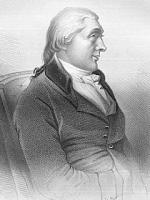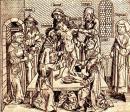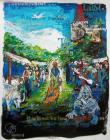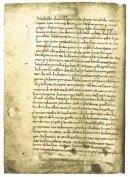My luve's in Germanie;
Send him hame, send him hame:
My luve's in Germanie;
Send him hame.
My luve's in Germanie,
Fighting brave for royalty;
He may ne'er his Jeanie see;
Send him hame, send him hame;
He may ne'er his Jeanie see;
Send him hame.
He's as brave as brave can be;
Send him hame, send him hame;
Our faes are ten to three;
Send him hame.
Our faes are ten to three;
He maun either fa' or flee,
In the cause of loyalty;
Send him hame, send him hame;
In the cause of loyalty;
Send him hame.
Your luve ne'er learnt to flee,
Bonnie dame, winsome dame;
Your luve ne'er learnt to flee,
Winsome dame.
Your luve ne'er learnt to flee,
But he fell in Germanie,
Fighting brave for loyalty,
Mournfu' dame, mournfu' dame;
Fighting brave for loyalty,
Mournfu' dame.
He'll ne'er come ower the sea;
Willie's slain, Willie's slain;
He'll ne'er come ower the sea;
Willie's gane!
He will ne'er come ower the sea,
To his luve and ain countrie.
This warld's nae mair for me;
Willie's gane, Willie's gane;
This warld's nae mair for me:
Willie's gane!
Send him hame, send him hame:
My luve's in Germanie;
Send him hame.
My luve's in Germanie,
Fighting brave for royalty;
He may ne'er his Jeanie see;
Send him hame, send him hame;
He may ne'er his Jeanie see;
Send him hame.
He's as brave as brave can be;
Send him hame, send him hame;
Our faes are ten to three;
Send him hame.
Our faes are ten to three;
He maun either fa' or flee,
In the cause of loyalty;
Send him hame, send him hame;
In the cause of loyalty;
Send him hame.
Your luve ne'er learnt to flee,
Bonnie dame, winsome dame;
Your luve ne'er learnt to flee,
Winsome dame.
Your luve ne'er learnt to flee,
But he fell in Germanie,
Fighting brave for loyalty,
Mournfu' dame, mournfu' dame;
Fighting brave for loyalty,
Mournfu' dame.
He'll ne'er come ower the sea;
Willie's slain, Willie's slain;
He'll ne'er come ower the sea;
Willie's gane!
He will ne'er come ower the sea,
To his luve and ain countrie.
This warld's nae mair for me;
Willie's gane, Willie's gane;
This warld's nae mair for me:
Willie's gane!
Contributed by Bernart Bartleby - 2016/1/20 - 15:54
Language: Italian
Traduzione italiana di Ahmed il Lavavetri
20.1.16
20.1.16
IL MIO AMORE E' IN GERMANIA
Il mio amore è in Germania;
mandatelo a casa, mandatelo a casa.
Il mio amore è in Germania;
mandatelo a casa.
Il mio amore è in Germania
a combattere ardito per la casa reale;
potrebbe non rivedere mai la sua Jeanie,
Mandatelo a casa, mandatelo a casa.
Potrebbe non rivedere mai la sua Jeanie,
mandatelo a casa.
Ha un coraggio che più non si può;
mandatelo a casa, mandatelo a casa.
Su dieci nemici, noi siamo in tre,
mandatelo a casa.
Su dieci nemici, noi siamo in tre,
lui non deve né cadere
e né fuggire per lealtà;
mandatelo a casa, mandatelo a casa,
e né fuggire per lealtà,
mandatelo a casa.
Il tuo amore mai non seppe fuggire,
bella signora, amabile signora;
il tuo amore mai non seppe fuggire,
amabile signora.
Il tuo amore mai non seppe fuggire,
ma è caduto in Germania,
combattendo ardito per lealtà,
afflitta signora, afflitta signora;
combattendo ardito per lealtà,
afflitta signora.
Non tornerà mai per mare,
Willie giace morto, giace morto;
non tornerà mai per mare,
Willie se n'è andato!
Non tornerà mai per mare,
dal suo amore e nel suo paese.
Questo mondo non c'è più per me,
Willie, Willie se n'è andato;
questo mondo non c'è più per me:
Willie se n'è andato!
Il mio amore è in Germania;
mandatelo a casa, mandatelo a casa.
Il mio amore è in Germania;
mandatelo a casa.
Il mio amore è in Germania
a combattere ardito per la casa reale;
potrebbe non rivedere mai la sua Jeanie,
Mandatelo a casa, mandatelo a casa.
Potrebbe non rivedere mai la sua Jeanie,
mandatelo a casa.
Ha un coraggio che più non si può;
mandatelo a casa, mandatelo a casa.
Su dieci nemici, noi siamo in tre,
mandatelo a casa.
Su dieci nemici, noi siamo in tre,
lui non deve né cadere
e né fuggire per lealtà;
mandatelo a casa, mandatelo a casa,
e né fuggire per lealtà,
mandatelo a casa.
Il tuo amore mai non seppe fuggire,
bella signora, amabile signora;
il tuo amore mai non seppe fuggire,
amabile signora.
Il tuo amore mai non seppe fuggire,
ma è caduto in Germania,
combattendo ardito per lealtà,
afflitta signora, afflitta signora;
combattendo ardito per lealtà,
afflitta signora.
Non tornerà mai per mare,
Willie giace morto, giace morto;
non tornerà mai per mare,
Willie se n'è andato!
Non tornerà mai per mare,
dal suo amore e nel suo paese.
Questo mondo non c'è più per me,
Willie, Willie se n'è andato;
questo mondo non c'è più per me:
Willie se n'è andato!
Caro Bernart, scusa se mi permetto di intervenire: io metterei il titolo: My Love’s in Germany(My Luve's in Germanie) visto che sulle copertine dei dischi di The Tannahill Weavers e Silly Wizard (a mio parere entrambe versioni meravigliose)è riportato My Love's in Germany.
Un abbraccio
Un abbraccio
Flavio Poltronieri - 2016/1/20 - 19:07
Ciao Flavio, per me va benissimo. Come ho scritto nell'intro, io mi sono solo limitato a scegliere tra le tante versioni quella segnalata su Mudcat Café come tratta "The Scottish Songs" di Robert Chambers, 1829.
E lì love è luve. Scusa il bisticcio.
Un caro saluto
E lì love è luve. Scusa il bisticcio.
Un caro saluto
Bernart Bartleby - 2016/1/21 - 09:03
×
![]()
Note for non-Italian users: Sorry, though the interface of this website is translated into English, most commentaries and biographies are in Italian and/or in other languages like French, German, Spanish, Russian etc.









Versi prevalentemente attribuiti al poeta scozzese Hector Macneill (1746-1818) ma in realtà – a quanto leggo su Mudcat Café - la paternità è piuttosto incerta, come spesso capita per le canzoni così antiche e sopravvissute da divenire tradizionali.
La melodia viene spesso indicata come la stessa di “Ye Jacobites by Name” di Robert Burns (che di Macneill fu contemporaneo, di una decina d’anni più vecchio), che però è a sua volta tratta da un’aria precedente, dai più individuata in quella di “Germany Thomas”, come per esempio indicato su Electric Scotland. Il suo titolo farebbe riferimento a tal Thomas Traill, un ufficiale originario delle isole scozzesi Orkney che combattè in Germania nella Guerra dei Trent’anni sotto le insegne del re di Svezia Gustav II Adolf. Thomas Traill pare si dilettasse di poesia e canzoni e, a questo punto, potrebbe essere addirittura lui l’autore originale dei versi, scritti dalla prospettiva di sua moglie. Il che sposterebbe la datazione del brano alla prima metà del 600.
Il testo che propongo è quello che su Mudcat Café viene tratto da “The Scottish Songs”, raccolta a cura di Robert Chambers edita nel 1829.
Versioni del brano sono state incise da vari artisti, come Targe (nell’album eponimo del 1980), The Tannahill Weavers (nel loro “Are Ye Sleeping Maggie” del 1976) e i Silly Wizard (nell’eponimo del 1976)